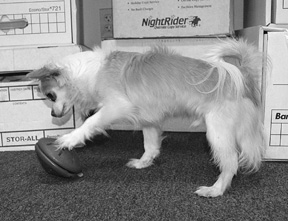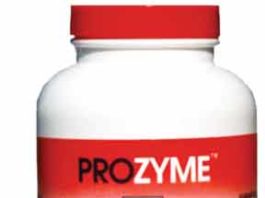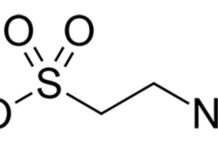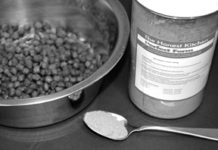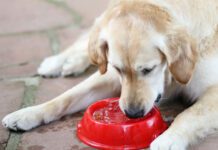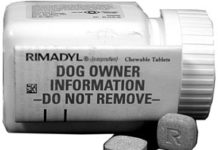Herbal Remedies for Inflammatory Bowel Disease (IBD)
Conventional approaches to inflammatory bowel disease often involve a controlled diet of highly digestible foods that are rich in supplemental dietary fiber. Often, cortico-steroid drugs (such as Prednisone) and other immunosuppressive drugs are prescribed to rapidly reduce pain and inflammation. These drugs may bring fast, temporary relief from painful symptoms, but they can be risky, especially if employed long-term.
Gluten-Free Dog Diets
Does your dog suffer from allergies, joint pain, epilepsy, recurrent ear infections, or other chronic health problems? Have you tried lots of treatments alternative and conventional but you just can't seem to help your dog get well and stay that way? You might want to look a little closer at the diet recommendations of John Symes, DVM.
DCM in Dogs: Taurine’s Role in the Canine Diet
Further, a significant number of the dogs were found to have reduced levels of circulating taurine in their blood and have responded positively to taurine supplementation. It is speculated that these cases are related to the consumption of foods that negatively affect taurine status, leading to taurine-deficiency DCM. Foods containing high levels of peas, lentils, other legume seeds, and/or potatoes were identified by the FDA as potential risk factors. These ingredients are found commonly in foods that are formulated and promoted as grain-free.""
The Canine Digestion Process
Digestion involves the balanced interaction of several biodynamic systems. A healthy animal ingests raw materials (food), changes these raw materials into usable nutrients, extracts from these nutrients the essentials for life and vitality, and excretes (in the form of feces) those substances that have not been digested or that werent utilized.
When a Low-Protein “Kidney Diet” Is Not the Answer
Every day, thousands of dogs are diagnosed with kidney disease. The first suggestion most conventional veterinarians make is to switch from whatever the dog has been eating to a low-protein “kidney diet” food. Clients are sent home with bags or cans of “prescription” food and warned not to feed high-protein foods or treats of any kind.
Colitis: An Urgent Problem
Conventional medical practitioners use the word colitis to indicate inflammation of the colon (the large intestine), as opposed to inflammation of the small intestine or the stomach. One of the large intestine’s most important roles is to absorb water. If the colon is not functioning properly, a lot of water is left in the stool; that’s diarrhea. There are many different types of diarrhea, and, unpleasant as it may be to contemplate, the characteristics of the diarrhea help us identify which part of the dog’s digestive system is not working properly.
Determining Your Dog’s Health Through His Feces
You can learn a lot about your dogs’ health from their poop. Its color, consistency, contents, odor, amount, and frequency can give you valuable, up-to-date information about their health. For example, it can provide early warning that your dog’s diet may be unsuitable, or that she may be grappling with parasites, viruses, unfriendly bacteria, bad water, emotional upset, food allergies, or serious illness.
The Anatomy of the Canine Kidney
Bone health is reliant upon healthy kidneys in at least two ways. First, vitamin D is necessary for the utilization of calcium, and the activated form of vitamin D is produced in the kidney. Second, normal kidneys excrete phosphorous; chronic renal failure may lead to excessive retention of phosphorous, which in turn causes an imbalance between calcium and phosphorous.
Dog Food Digestibility Levels Matter
What is digestibility and why does it matter? Digestibility reflects a food's ability to deliver essential nutrients to the dog who eats it. This ultimately affects not only defecation quantity and quality (how much your dog poops and how the poop looks and smells), and a dog's propensity for flatulence (no explanation needed), but more importantly, a dog's long-term health and wellness. The graphic on this page summarizes how digestibility is measured using feeding trials with dogs.
Bad Breath in Dogs
Bad breath, whether sudden or chronic, can be a sign of illness in dogs.
The Dog is Throwing Up!: Your Guide to All Things Dog Vomit
When dogs feel nauseated and are about to throw up, they often drool, lick their lips, swallow excessively, and stand head down looking worried. Many dogs look for or turn to their owners when they're about to vomit, which can signal alert caregivers to move their pets to a better location! In time you might be able to train your dog to throw up where it does the least damage.
Probiotics and Dogs
Curly, a five-year-old Standard Poodle, eats the best food his human can afford. Raw chicken, rabbit, and venison are his favorites. Tina, his two-legged companion, switches the meats every few days, mixing the protein with some sweet potato, carrots, an occasional stalk of broccoli, and always a good fish oil supplement. Plus, to be sure that Curly is getting full nutritional benefit from every delicious bite, Tina always adds a sprinkling of a probiotic and digestive enzyme supplement as a final touch. Everything Curly eats is the best of the best: human-grade ingredients, no preservatives, no by-products. But somehow, despite all of the good lovin' and great food, Curly is a bit thin, won't put on weight, and his stool is sometimes dry making it hard for the poor guy to poop during his daily walks. Tina knows that something is amiss and she is worried. She was told that maybe the probiotics weren't active, so she tried several different brands. But nothing has improved. So what gives; is it that the probiotics don't work? Adding supplemental Lactobacillus acidophilus, Bifidobacterium bifidum, Lactobacillus bulgaricus, or other probiotic organisms to your dog's diet is almost always a good idea. This will support the resident microflora that are always present in Curly's gut, enhancing digestion and absorption of nutrients, supporting detoxification and elimination processes, and helping to boost his immune system.


